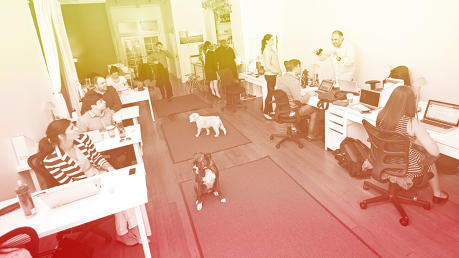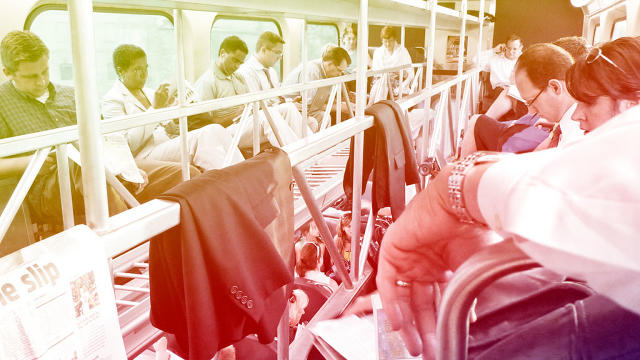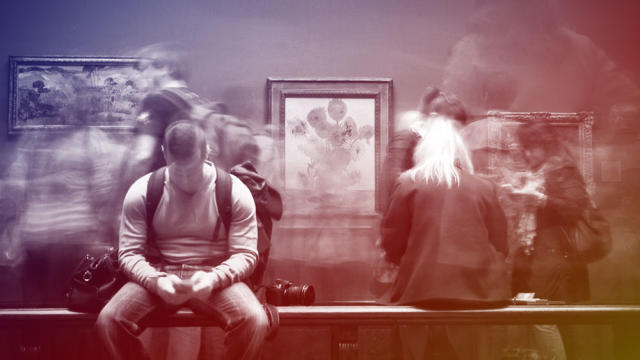These Are The New Rules of Work

Work is increasingly both everywhere and nowhere—more deeply embedded in our lives than ever before, but disappearing as a discrete activity.
The old rules of work applied to an economy of factories and offices, a world of “standard,” stable employment with large employers, over careers with more or less predictable trajectories. The new rules belong to another universe—flexible, precarious, and entrepreneurial, less and less tied to specific times, places, and employers.
In his 1931 essay “Economic Possibilities For Our Grandchildren,” the economist John Maynard Keynes predicted that within a few generations, “man will be faced with his real, his permanent problem—how to use his freedom from pressing economic cares, how to occupy the leisure, which science and compound interest will have won for him, to live wisely and agreeably and well.”
Here we are in the future, and while the technological advances he predicted continued, the post-work utopia never emerged. So how should we navigate a world where every moment, including sleep and leisure, can now be colonized by work, by the possibility of monetization and optimization?
Old Rule: You commute into an office every day.
“Rush hour” is disappearing: New York City’s subway system reports that “weekday growth was strongest outside of the traditional morning and evening rush hours” as people ditch the traditional commute to live and work differently. Co-working spaces are popping up everywhere: one estimate puts the number above 20,000—a virtual doubling in the number of co-working spaces globally since 2008. Work-from-home policies are increasingly standard among employers, and remote work is a growing trend—Automattic, the company behind WordPress, is 100% remote, its employees scattered in bedrooms and home offices everywhere. The Remote Year initiative enables 100 remote workers to spend one month in 12 different locations across the globe. Technology may be the great enabler, but the impulse is deeply human: we want to live life on our terms in the place we are most comfortable, and we can work there, too.

Old Rule: Work is “9-to-5”
Time matters just as much space. The upside is working when we want to—employers are increasingly likely not to care exactly when the work is done, as long as it gets done well and on deadline. The downside is always being on call—the same screens that connect us to many aspects of our personal lives are also the means of production.
According to a 2013 survey by the American Psychological Association, “More than half of employed adults said they check work messages at least once a day over the weekend.” Almost the same number also did so before or after work on weekdays and during sick days. A full 44% even do it while on vacation. Also in 2013, the American Time Survey found that 34% of those employed work on an average of one weekend day every week, rising to 43% in the growing ranks of the self-employed.
Even sleep is under siege, reports Jonathan Crary in his book 24/7: Late Capitalism And The Ends Of Sleep, with the average North American adult now sleeping approximately six-and-a-half hours a night, down from eight hours a generation ago, and 10 in the early 20th century. More disturbingly, adds Crary, “Recent research has shown that the number of people who wake themselves up once or more at night to check their messages or data is growing exponentially.” It’s up to us to set the limits.
Old Rule: You have a full-time job with benefits.
Last year, and the freelancer marketplace Upwork (formerly Elance-oDesk) estimated that there are 53 million freelancers in the U.S., which represents 34% of the workforce. No wonder the polite question to ask these days is not “Where do you work?” but “What are you working on?”
All freelancers share a focus on getting gigs, which are the new unit of work, but surveys find that around half of freelancers feel lucky and liberated, while the other half are seriously stressed, wishing they could find full-time work. The Freelancers Union survey identified “independent contractors, moonlighters, diversified workers, temporary workers, and freelance business owners” as distinct groups within the freelance workforce—anything but one-size-fits-all.

Old Rule: Work-life balance is about two distinct, separate spheres.
Companies are obsessed with work-life balance, says André Spicer of the City University Business School in London—”but the more people talk about it, the less it seems to actually exist. The realities of contemporary work involve a complete blurring of work and life. We try to establish barriers but they are constant knocked down.”
Take the constant search for new income streams: when platforms like Airbnb and Uber enabled the monetization of “slack” resources, many people suddenly had themselves working overtime as landlords or drivers. Time with friends is replaced by networking. Social media updates, once entirely personal, are now an extension of your CV, another way to constantly be selling yourself.
Old Rule: You work for money, to support yourself and your family.
Don’t ever say you “just need a job”—”the unofficial work mantra for our time,” wrote Miya Tokemitsu in a widely discussed article, is “Do What You Love.” Employers looking to harness or answer the “passion” of workers are increasingly branding themselves as movements and causes, anything but a boring old company that makes widgets.
The problem with “Do What You Love,” says Tokemitsu, is that “it leads not to salvation, but to the devaluation of actual work . . . Its real achievement is making workers believe their labor serves the self and not the marketplace.” Instead of enabling the good life, work gobbles it up entirely.
Self-actualization, says Carl Cederström of the Stockholm Business School, “is not necessarily something we want, but something that we’re required to do.” When so many of us are in the persuasion business—persuasion workers now account for some 30% of U.S. GDP, estimated economist Gerry Antioch in 2013—it’s no surprise that we have to start by persuading ourselves of the life-or-death importance of what we’re doing.
